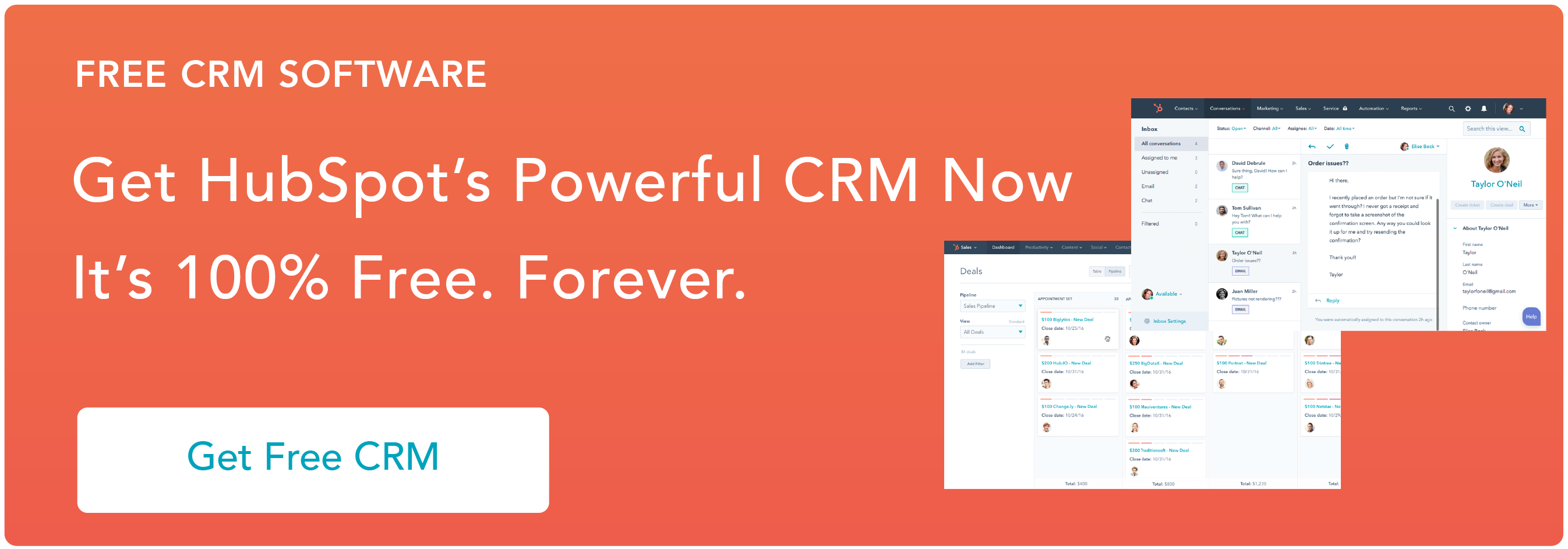
What kind of CRM software program is correct for your online business? Companies use buyer relationship administration software program (CRM) to handle their relationships and interactions with prospects and clients (in addition to the information that outcomes from these relationships and interactions). A CRM will help any enterprise enhance its buyer expertise and the client’s journey.

However not all CRMs ship the identical performance. Normally, they fall into one (or extra) of the next varieties: Operational, analytical, or collaborative CRMs. Right here’s a take a look at how they work and what they provide that will help you discover the best-fit CRM for your online business.
Sorts of CRM
- Operational CRMs: Designed to simplify and streamline processes.
- Analytical CRMs: Designed to collect and analyze buyer knowledge.
- Collaborative CRMs: Designed to mix advertising and marketing, gross sales, and repair knowledge.
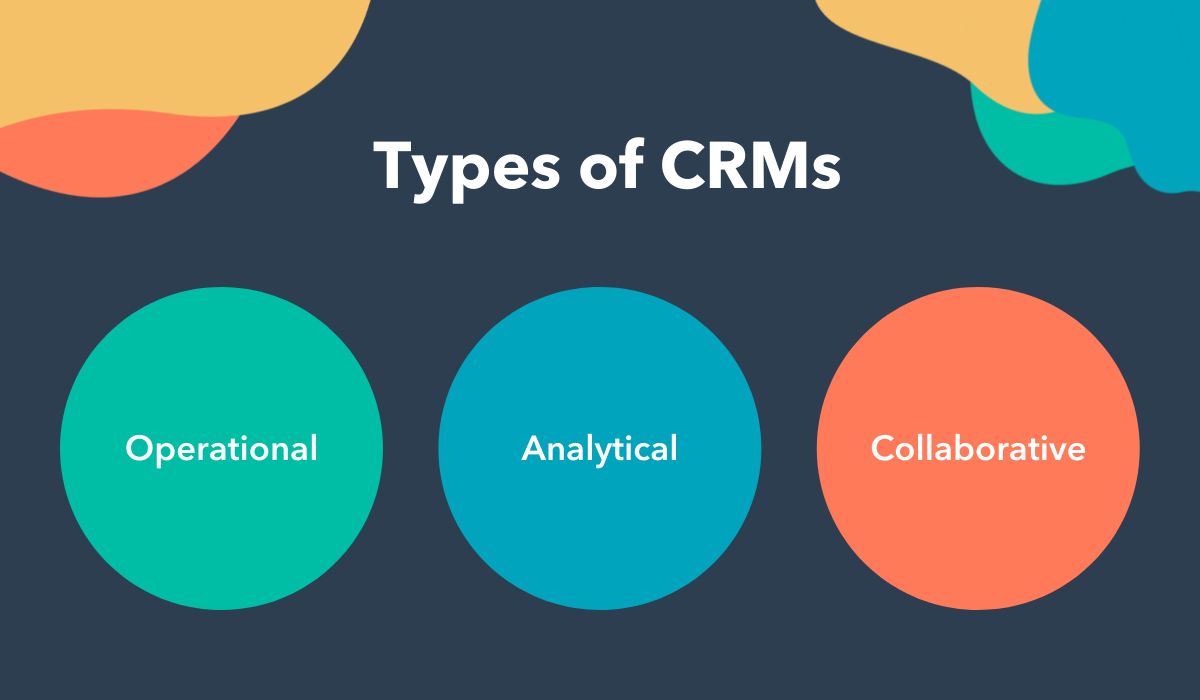 Instance of Operational CRM: HubSpot
Instance of Operational CRM: HubSpot
Operational CRM options reminiscent of HubSpot supply methods to automate key processes reminiscent of advertising and marketing, gross sales, and repair to enhance the shopper expertise and drive conversions. We’ll speak extra about this under.
Instance of Analytical CRM: Zoho
Analytics CRM instruments reminiscent of Zoho present knowledge warehousing, knowledge mining, and on-line analytical processing (OLAP) instruments to offer actionable buyer insights.
Instance of Collaborative CRM: Copper
Collaborative CRMs reminiscent of Copper ship interplay and channel administration to assist perceive the shopper journey from preliminary contact to conversion.
Let’s discover the variations intimately between the three kinds of CRMs available on the market — and why you may select one over one other.
Operational CRM
An operational CRM streamlines and simplifies a corporation’s principal enterprise processes. In doing so, the software will help corporations generate leads, convert these leads into contacts, and supply the service infrastructure needed to please and retain clients.
What does an operational CRM sometimes assist? Three principal capabilities stand out.
1. Advertising and marketing Automation
Operational CRMs simplify and streamline time-consuming and handbook duties for entrepreneurs with the assistance of promoting automation. They automate tedious duties like coordinating e mail campaigns, distributing content material affords, and reaching out to contacts at scale.
Some CRMs may ship advertising and marketing analytics, observe the ROI of on-line adverts, and supply corporations deep perception into particular person leads. Some may even assist companies with more difficult, specialised advertising and marketing practices like web optimization and running a blog.
2. Gross sales Automation
Gross sales automation is supposed to streamline an organization’s gross sales course of, enabling reps to spend extra time interacting with prospects and bringing clients on-board.
Gross sales automation usually contains processes like e mail scheduling for leads, instruments that allow prospects to schedule conferences with reps, and options to trace gross sales calls.
Many operational CRMs additionally make life simpler for gross sales reps by enabling workflows that permit them to simply and mechanically rotate leads, delegate contacts, and create offers and duties. Moreover, operational CRMs usually supply options like gross sales file creation, higher gross sales file visibility, and less complicated lead prioritization.
3. Service Automation
Service automation is the ultimate piece of the operational CRM puzzle. Its goal is to assist an organization create a unprecedented expertise for patrons, hold them loyal, and encourage them to advertise the corporate model.
Service automation virtually at all times units a framework for one-on-one correspondence between service reps and clients. This will likely embody issues like organising inboxes that combination buyer emails or coordinating dwell chats and organising chatbots.
Service automation additionally gives methods to delegate service duties to reps through ticketing methods. Extra options reminiscent of a information base or FAQ pages are additionally generally related to service automation.
Who ought to use an operational CRM?
Companies with extra linear gross sales processes will normally get essentially the most out of operational CRMs. SMBs can get rather a lot out of those platforms, however that’s to not say that operational CRMs are particular to their wants. Even bigger enterprise corporations can profit from utilizing this sort of software program.
In the end, if your organization is attempting to automate its workflow and take the human factor out of the extra monotonous, administrative aspect of your online business, an operational CRM is the way in which to go.
Operational CRM System Instance: Hubspot
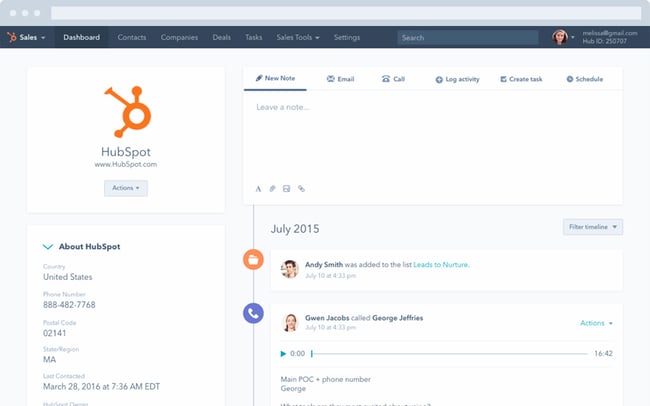
HubSpot is an all-in-one CRM platform meant to align inner groups, pull significant insights, and report on development alternatives. It does this by combining Advertising and marketing Hub, Gross sales Hub, Service Hub, and CMS Hub, together with tons of of obtainable integrations, to facilitate advertising and marketing, gross sales, and repair processes.
HubSpot automates handbook duties (knowledge entry, knowledge sync, and make contact with knowledge updates) and helps you create an expertise and purchaser’s journey that your clients will love by centering your complete enterprise round your clients.
HubSpot is straightforward to make use of and syncs all interactions your staff has with leads and clients to that particular person’s timeline to take care of organized and correct contact data for all your inner staff members to entry and reference.
- Value: Free endlessly; $45/ mo, Starter; $450/ mo Skilled; $1,200/ mo, Enterprise
- Greatest for: Any scaling companies, from SMB to enterprise, and any staff, together with advertising and marketing, gross sales, customer support, operations, or C-suite.
- Key options: HubSpot CRM affords every little thing in a single place to assist your staff take advantage of course of automation and system integration. Attempt it without cost to see the way it matches your online business.
Analytical CRM
Analytical CRMs depend on knowledge gathering and evaluation to assist corporations higher serve their clients — some examples of this data are buyer preferences, behaviors, and make contact with data.
Corporations can then leverage the information they’ve collected for higher gross sales efforts, focused advertising and marketing campaigns, and personalised buyer assist. Typically talking, essentially the most essential parts of an analytical CRM are knowledge warehousing, knowledge mining, and OLAP instruments.
1. Information Warehousing
A knowledge warehouse is a sort of database included into many analytical CRMs. It gives some of the efficient methods analysts can use to gather, combine, and put together buyer knowledge for evaluation.
A knowledge warehouse shops present and historic knowledge in a single place and makes processes like knowledge extraction and conducting knowledge evaluation simpler than in additional typical databases.
2. Information Mining
The subsequent element of an analytical CRM is knowledge mining — a catch-all time period for the method of discovering patterns in giant knowledge units.
Analytical CRMs use knowledge mining strategies to trace data and knowledge tendencies related to buyer pursuits. This enables them to supply a greater image of an organization’s buyer lifecycle: a course of that encompasses buyer identification, attraction, retention, and improvement.
3. OLAP Instruments
The third element of your typical analytical CRM is On-line Analytical Processing (OLAP) instruments. It’s a class of instruments used to investigate knowledge saved in databases. These instruments are used to guage multidimensional knowledge from a number of views.
For instance, a enterprise might wish to analyze how clients are interacting with its web site. It has entry to knowledge concerning the on-line options clients are utilizing, clients’ areas, and once they’re logging on. Having a complete image of this knowledge may give salespeople perception into how, the place, and when they need to be reaching out to prospects.
As a substitute of analyzing every of these dimensions individually, OLAP instruments allow that enterprise to conduct an evaluation on all of them concurrently. OLAP options additionally let companies see how clients in particular areas are interacting with their web site over particular time frames.
In the end, OLAP instruments are what an analytical CRM makes use of to validate hypotheses that will have been derived from data accrued by its different parts.
Within the instance supplied above, the opposite elements of the CRM would have gathered the information on how, when, and the place clients are interacting with the positioning. Its OLAP instruments would have clarified and utilized that data, giving that enterprise a greater thought of tips on how to conduct its gross sales, advertising and marketing, and repair efforts.
Who ought to use an analytical CRM?
Analytical CRMs are greatest for companies trying to leverage knowledge to get an image of how their clients function.
In the event you’re , it additionally wouldn’t damage to have an worker — or just a few — at your organization who’s prepared to make a aware effort to study some fairly technical software program. Analytical CRMs aren’t essentially tough to make use of, however they take a bit extra work to determine.
Analytical CRM System Instance: Zoho Analytics
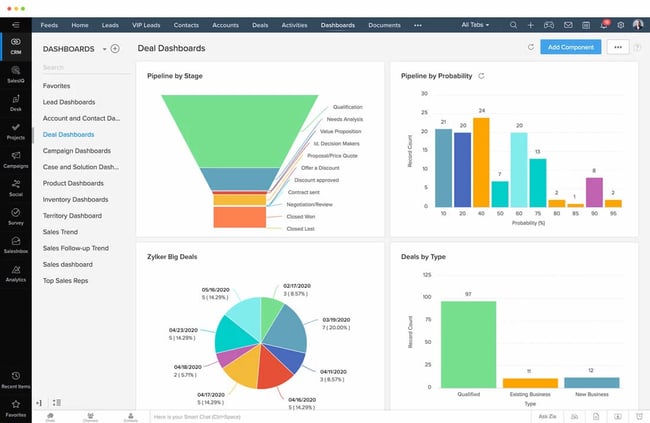
Zoho Analytics provides you real-time analytics to assist inform smarter enterprise selections. The software program permits your knowledge to remodel big quantities of uncooked knowledge into actionable experiences and dashboards. These capabilities can allow you to raised observe key efficiency indicators (KPIs) reminiscent of variety of received offers and clients.
- Value: $22/ mo, Fundamental; $45/ mo, Normal; $112/ mo, Premium; $445/ mo Enterprise
- Greatest for: Companies trying to enhance their knowledge evaluation and reporting capabilities.
- Key options: Zoho is all about delivering real-time knowledge to your CRM dashboard so your staff could make higher selections proper now and drive long-term gross sales and advertising and marketing methods.
Collaborative CRM
A collaborative CRM brings collectively an organization’s advertising and marketing, gross sales, and repair knowledge to enhance synchronicity throughout the enterprise and provides every division a greater understanding of their clients’ wants, needs, and pursuits.
A collaborative CRM has two key parts — interplay administration and channel administration.
1. Interplay Administration
Interplay administration is a course of that tracks each interplay between a enterprise and its clients — whether or not by means of e mail, social media, face-to-face interactions, telephone calls, or different communication channels.
Interplay administration permits an organization to maintain a log of those sorts of correspondence, in addition to staff notes about them. Completely different enterprise models can then share this data throughout the group.
2. Channel Administration
Channel administration takes interplay administration a step additional. It’s the method of utilizing the knowledge gathered and analyzed throughout interplay administration to determine and, in the end, pursue the communication channels that greatest swimsuit buyer preferences.
Ought to your organization’s customer support unit talk primarily through e mail or chat? Ought to your gross sales staff make a degree of pursuing one-on-one conferences or telephone calls with prospects? These are the sorts of questions that channel administration is designed to reply.
Who ought to use a collaborative CRM?
Companies which are unfold throughout a number of bodily areas or have many groups stand to achieve rather a lot from collaborative CRMs’ emphasis on enterprise unit synchronicity.
The identical goes for corporations that rely closely on cross-department communication. It goes with out saying, however a collaborative CRM received’t be match for any firm not comfy with buyer data being shared liberally all through the group.
Collaborative CRM System Instance: Copper
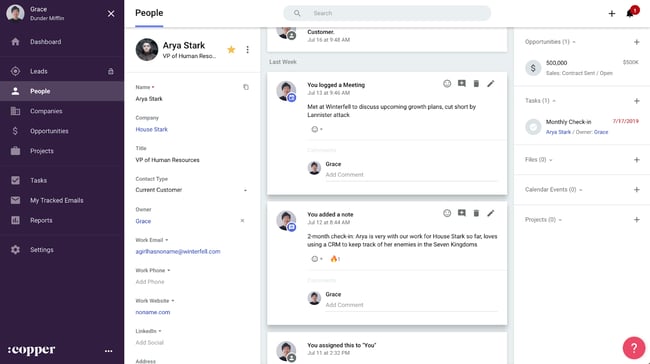
With Copper, all of your buyer knowledge is saved in a single place, permitting everybody throughout your group to be within the loop about any buyer interplay or deal. The platform’s user-friendly interface additionally options customized pipelines and dashboards. Copper is an effective selection for small companies on the lookout for a easy, simple CRM that integrates seamlessly with Google Workspace.
- Value: $25/ mo, Fundamental; $59/ mo, Skilled; $119/ mo, Enterprise
- Greatest for: Small companies that place an emphasis on collaboration and are eager about a CRM with a user-friendly interface.
- Key options: Copper affords a easy and simple solution to retailer and share buyer knowledge throughout your group. Integration with Google Workspace can be a plus to streamline operations.
Operational, Analytical, or Collaborative CRM?
Every kind of CRM has its personal advantages, nevertheless it’s essential to acknowledge which type of CRM most closely fits your wants and make your resolution with that in thoughts.
In the event you’re trying to streamline your gross sales, advertising and marketing, and customer support, go for operational. In the event you’re wanting to make use of arduous knowledge to raised perceive your clients, prioritizing analytical will be the solution to go. And if you wish to make enterprise synchronicity and collaboration your principal priorities, think about collaborative CRMs.
Editor’s be aware: This submit was initially printed in December, 2019 and has been up to date for comprehensiveness.
